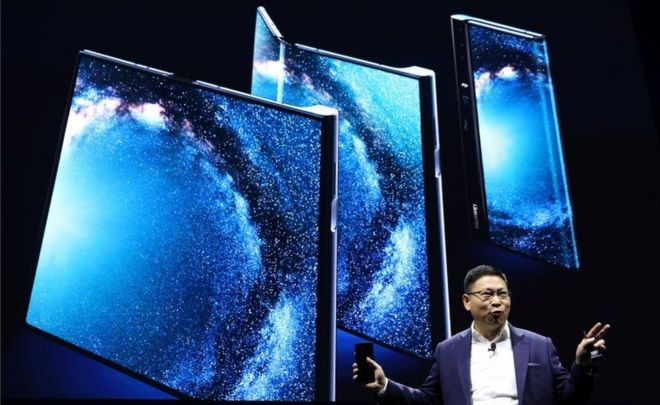 REUTERS
REUTERS
Huawei has revealed its first smartphone to feature a foldable screen, less than a week after its rival Samsung did the same.
The rival handset-tablet hybrids have contrasting designs.
Huawei's Mate X places its fold-out screen on the outside of the device, so that it covers the front and rear of the phone when closed.
In both modes, the display is larger than Samsung's. Huawei's device is also flatter and thinner when shut.
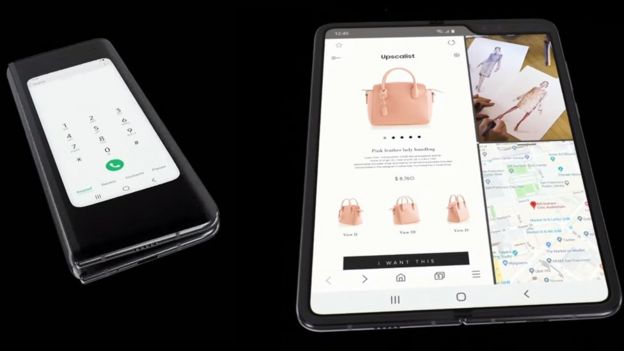 SAMSUNG
SAMSUNG
However, unlike Samsung's Galaxy Fold it does not have a second display on its reverse side.
One analyst attending the launch event in Barcelona also remarked that a crease in the screen appeared to be visible.
- Nokia 9 uses five cameras to take a photo
- Samsung reveals Galaxy Fold and S10 5G
- Xiaomi reveals fold-in-three smartphone
The Chinese company allowed attendees at the event to get a close look at the handset following its unveiling. Its South Korean competitor has yet to let outsiders to do so with the Galaxy Fold.
"Security concerns about Huawei's 5G kit are a shadow hanging over the whole of this year's Mobile World Congress," commented the BBC's technology correspondent Rory Cellan-Jones.
"But the firm was determined in a confident, even arrogant press conference to convey that it's now the leading innovator in smartphones."
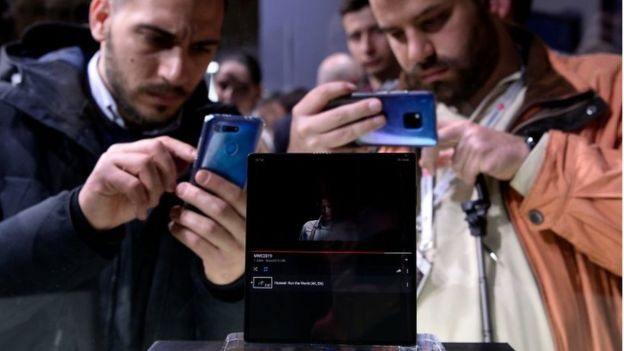 GETTY IMAGES
GETTY IMAGES
For comparison's sake, Huawei said:
- the Mate X's screen is 8in (20.3cm) when unfolded
- when closed, the Mate X's larger screen is 6.8in and the smaller one 6.6in - which makes both bigger than that of the iPhone XS Max
- when shut, the Mate X is 11mm (0.43in) thick
- the Samsung Galaxy Fold's main screen is 7.3in (18.5cm) when unfolded
- the Fold's other display is 4.6in
- the Fold measures 17mm (0.67in) thick at its widest point when closed
Unlike the Fold, the Mate X does not place any of its cameras on the same side as its screen when unfolded.
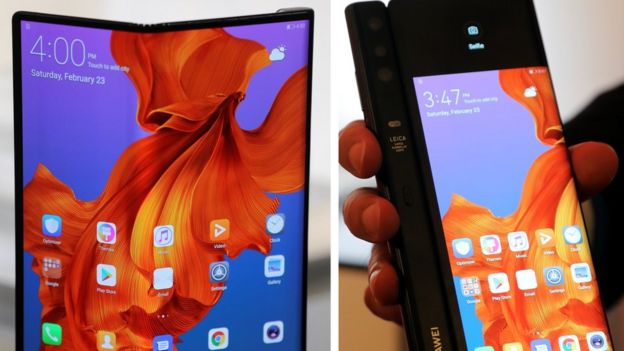 REUTERS
REUTERS
Instead they are placed on the flipside of the device on a strip that also features a fingerprint sensor. This runs down the side of the smaller of the two folded displays when closed and doubles up as a side-grip when open.
This potentially places the Mate X at a disadvantage to the Fold, since it becomes impossible to use its unfolded screen to take selfies. However, it is not yet clear whether this will be a serious consideration in practice.
However, the Mate X's advantage is that it does not have a "notch" cut into its screen as a consequence.
5G connections
Huawei said the Mate X would come with one of its existing 5G modems and could download a one gigabyte movie in as little as three seconds if a fast enough connection was available.
Like Samsung's device, it also features a battery on each of its two sides, but claims to be able to recharge more quickly.
"Both foldable phones are 5G-capable and are instantly distinctive from the smartphone designs of the last 10 years," commented Ian Fogg, an analyst at the mobile analytics company Opensignal.
"But 5G is arriving on regular designed smartphones too, at lower prices, and more quickly.
"Because of that, more people will experience the benefits of 5G this year than the novelty of an expanding smartphone display."
The Mate X has been priced to start at 2,299 euros ($2,600; £1996) and is due to go on sale from the middle of this year.
That compares to the $1,980 figure quoted by Samsung, although once taxes are taken into account the gap should be smaller.
Huawei's consumer devices chief Richard Yu acknowledged that the price was "very expensive" but said he hoped it would be reduced over time.

Analysis:
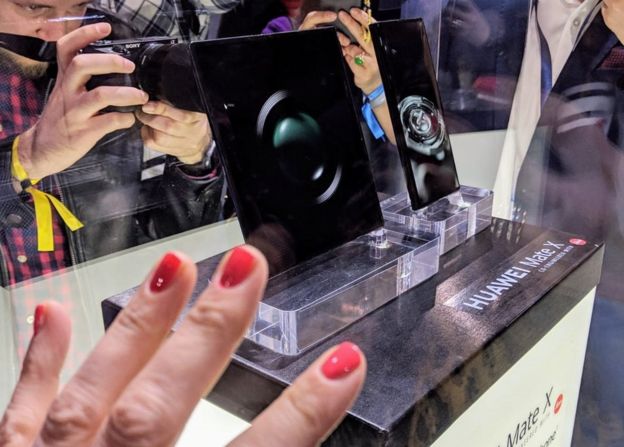
Zoe Kleinman, Technology reporter, Barcelona
There were claps and cheers as Richard Yu finally unveiled Huawei's latest masterpiece after three years in development - the folding phone.
And the hits just kept on coming: its split-screen function, its dimensions - gleefully compared to those of the iPhone and Galaxy Fold - even a protective case got its own round of applause.
However, the biggest gasps came right at the end - when he announced the price tag. At 2,299 euros, even the hardcore enthusiasts appeared to wince.
Everybody who charged to the demonstration area afterwards was disappointed as the handsets remained frustratingly behind Perspex.
Still, the Mate X has still done enough to secure its "wow factor" at MWC.
But that price and Huawei's wider controversies threaten to act as a deterrent to even deep-pocketed early adopters.

Zoom in
Two other Chinese companies have also unveiled new handsets ahead of Monday's start of the Mobile World Congress trade show.
Oppo has showed off a handset with a 10x optical zoom.
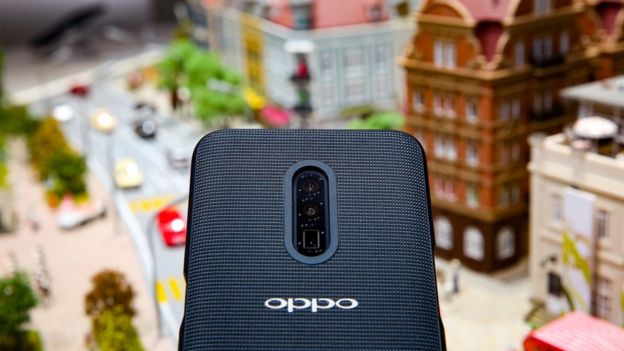 OPPO
OPPO
Unlike digital zooms, there is no loss of quality as the shot tightens in.
The three cameras involved do not need to extend from the phone to achieve this. Instead, the device features a periscope-like system inside its chassis.
This lets it range between focal lengths of 16mm and 160mm.
The innovation builds on an earlier prototype, which was never put into production, that offered a 5x zoom.
However, the design means the handset is by necessity thicker than most rivals.
In addition, the company announced it would soon launch 5G handsets in Australia, Singapore, Switzerland and China.
Xiaomi also held a press conference where it revealed its forthcoming flagship Mi 9 handset will cost 449 euros when it launches in Europe.
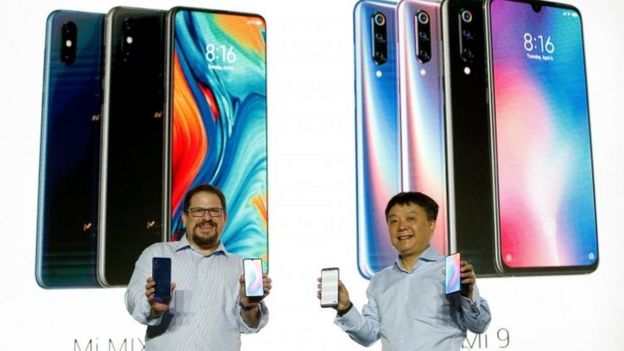 EPA
EPA
It features three rear cameras, one of which offers 48 megapixel resolution.
In addition, the firm said it intended to launch a 5G handset - the Mi Mix 3 5G - costing 599 euros, which is likely to be one of the lowest-cost models to be compatible with next-generation networks.
However, a demo of the firm's smart home technology fell flat after a series of attempts to show off voice-controlled commands failed.

No comments:
Post a Comment